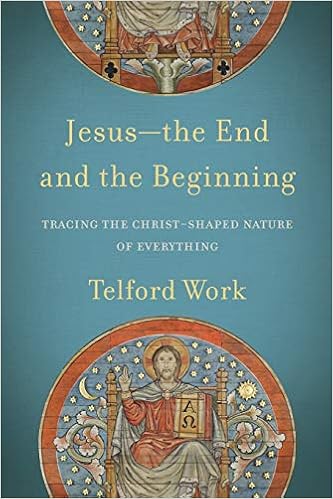Longtime churchgoers joke that the answer to every Sunday school question is always a resounding "Jesus!" But how is Jesus the answer to all matters of faith? Telford Work, in his new book Jesus—The End and the Beginning (Baker Academic, 2019), agrees but laments that evangelicalism is unable to explain how Jesus becomes the final answer to all things. This book, adapted from a series of lectures given by the author, probes the metaphor of Jesus as "alpha and omega" and how that informs, simply put, everything.
Work explores Jesus as the end and the beginning of God, the cosmos, humanity, Israel, the nations, and a life. His scope is comprehensive and top-down—from God himself, to the universe he made, to the people he made, to the nation he chose, to the lives he made—showing how the Christ-shaped nature permeates all domains of existence.
Part theological and part philosophical, this book is difficult to classify. It defies a simple systematic theology or Christology book, yet it is far more advanced than a devotional read. It is full of academic jargon and scholarly references, yet it moves to application on our personal lives. Work's overarching questions include, "What has Christ put an end to in your life? What has Christ started in your life? What difference does it make that Jesus is the beginning and the end of everything?" It is a challenging read—not simply on account of its intermediate to advanced theological knowledge which he assumes, but because the author demands that we think beyond simplistic Sunday school answers and consider making Christ the beginning and end of everything in our lives.
This is a necessary read for theologians infatuated with intellectualism but not with emotionalism, for evangelicals in love with Jesus but knowing nothing about him, and everyone else in between. May this book better illuminate how Christ is to be the shaper of all things.
(My thanks is given to Baker for providing a complimentary review copy in exchange for an honest review.)
Work explores Jesus as the end and the beginning of God, the cosmos, humanity, Israel, the nations, and a life. His scope is comprehensive and top-down—from God himself, to the universe he made, to the people he made, to the nation he chose, to the lives he made—showing how the Christ-shaped nature permeates all domains of existence.
Part theological and part philosophical, this book is difficult to classify. It defies a simple systematic theology or Christology book, yet it is far more advanced than a devotional read. It is full of academic jargon and scholarly references, yet it moves to application on our personal lives. Work's overarching questions include, "What has Christ put an end to in your life? What has Christ started in your life? What difference does it make that Jesus is the beginning and the end of everything?" It is a challenging read—not simply on account of its intermediate to advanced theological knowledge which he assumes, but because the author demands that we think beyond simplistic Sunday school answers and consider making Christ the beginning and end of everything in our lives.
This is a necessary read for theologians infatuated with intellectualism but not with emotionalism, for evangelicals in love with Jesus but knowing nothing about him, and everyone else in between. May this book better illuminate how Christ is to be the shaper of all things.
(My thanks is given to Baker for providing a complimentary review copy in exchange for an honest review.)

Comments
Post a Comment